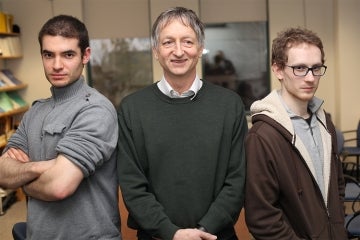
Peer discussions can provide students with an authentic experience of how ideas and findings are debated within the scientific community," says Ashok.
Early Career Teaching Award spotlight: Q & A with biologist Aarthi Ashok
Published: November 2, 2015
Heated in-class student debates may seem the territory of political science classes but they’re just as crucial to communicating the how’s and why’s of cell biology, says Aarthi Ashok.
Ashok is an associate professor, teaching stream, in the department of biological sciences at U of T’s Scarborough campus.
“Professor Ashok promotes abstract thinking and inquiry by constantly reminding students that anything is possible in the field of science and that we have still much to uncover,” said Aarushi Bansal, a fourth-year human biology and psychology student who learned cell biology with Ashok.
“Her ability to break down and convey information regarding various topics in biology, and explain them in accordance with my level and background was exceptionally valuable, as she was able to simplify complex ideas through analogies and questions.”
Ashok is one of four teaching leaders receiving the first-ever University of Toronto Early Career Teaching Awards this year. They are:
Aarthi Ashok, associate professor, teaching stream, department of biological sciences, UTSC
Fiona Rawle, associate professor, teaching stream, department of biology, UTM
Michael Reid, lecturer, department of astronomy and astrophysics, Faculty of Arts & Science
Kyle Smith, assistant professor, department of historical studies, UTM
This is the fourth and final instalment of the U of T News series profiling each of the winners (read about biologist Fiona Rawle; read about astronomer Mike Reid; read about historian Kyle Smith). They are set to receive their certificates at the University of Toronto Excellence in Teaching Reception on Nov. 3 from 5:00pm-7:00pm in the Common Room at Massey College.
What drew you to teaching?
The opportunity to continually learn with my students about the ever-evolving field of biology.
What do you love most about it?
The chance to inspire and connect with my students through in-class activities. I design interactive discussions and activities to spark dialogue with my students in all my courses. Eventually, even some of the most reticent students join the conversation.
One particularly introverted student once told me at the end of the term – and this is of course paraphrased from what I recollect – something like, “I thought you were nuts trying to get us to talk to you, act out cell biology, and discuss ethical dilemmas. I just wanted you to get on with the class. But you seemed to really want to hear what we had to say and I eventually started talking to people around me. Now, at the end of the term, I want to talk in all my courses. I remember what you teach in the class if I have the chance to think and discuss it while I’m learning.”
I believe peer discussions can provide students with an authentic experience of how ideas and findings are debated within the scientific community. Modeling this in my classes, however imperfect my technique, is what I really love to do!
How would you describe your teaching style?
My classrooms are spaces for mutual learning. I strive to create an atmosphere where learning is a group activity from which I am not exempt. My philosophy is firmly rooted in active, participatory learning through discussion.
Why is integrating research and teaching important?
In order to nurture students to have a lifelong appreciation of biology, I believe we need to ensure the biology they learn in class has significant implications for the societal or personal problems they encounter every day. My students appreciate their ability to evaluate scientific evidence in making personal life decisions about vaccinations, health treatments or even political stances (when scientific funding or concerns are part of political platforms).
Students learn how to evaluate evidence through the scientific process: proposing hypotheses, experimenting, rigorously analysing data and describing conclusions as evidence that supports or negates the original hypotheses.
Engaging students in original research at the bench or engaging them with active discussions of recent scientific findings in literature are both key to developing necessary scientific and critical thinking skills. I believe that by integrating research and teaching we make students part of the scientific community. It helps them learn how to think critically about the best approach to address future problems. It also helps them develop a positive attitude towards scientific research in general.
I continually incorporate research data and findings into my teaching materials as well, and continue to approach teaching with the same sense of inquiry I acquired through my scientific training.
What have you learned from your students?
I’ve learned a great deal! First, I’ve learned to listen and evolve. My courses have often morphed into much better versions of the original when I do my best to consider student opinions and provide them with opportunities for feedback in my courses.
My students have also helped me appreciate the human connection to learning. Showing students I genuinely care about their learning, and that I believe they can meet the high standards of a course, can have a big impact.
I will never forget the time I had a face-to-face meeting with a student to communicate that I was concerned about her performance on assessments and was deeply concerned about her learning experience. The student’s sullen expression broke into a smile as she said “You care? Really?” I won’t credit my one private interaction with this student as the sole reason for a grade change from a D to a B+ in the course, but I’ll certainly hold on to the message that communicating genuine concern for individuals, and expressing a firm belief in their potential, is exceedingly important!
Why have you chosen to teach at U of T?
My colleagues at U of T are amazing educators and researchers. And, while I am excited to be part of this community, what I enjoy most about teaching at U of T is the challenge and exhilaration that comes from guiding our outstanding students.



